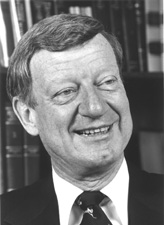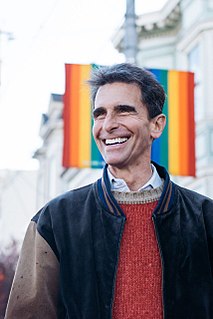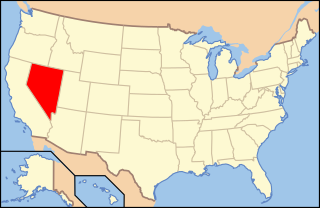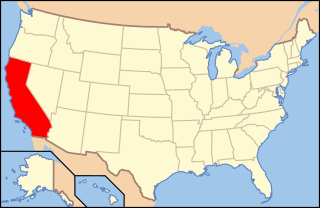
William Victor Roth Jr. was an American lawyer and politician from Wilmington, Delaware. He was a veteran of World War II and a member of the Republican Party. He served from 1967 to 1970 as the lone U.S. Representative from Delaware and from 1971 to 2001 as a U.S. Senator from Delaware. He is the most recent Republican to have served as a U.S. Senator from Delaware.

The California State Legislature is a bicameral state legislature consisting of a lower house, the California State Assembly, with 80 members; and an upper house, the California State Senate, with 40 members. Both houses of the Legislature convene at the California State Capitol in Sacramento. The California state legislature is one of just ten full-time state legislatures in the United States.

The Maryland General Assembly is the state legislature of the U.S. state of Maryland that convenes within the State House in Annapolis. It is a bicameral body: the upper chamber, the Maryland State Senate, has 47 representatives and the lower chamber, the Maryland House of Delegates, has 141 representatives. Members of both houses serve four-year terms. Each house elects its own officers, judges the qualifications and election of its own members, establishes rules for the conduct of its business, and may punish or expel its own members.
Same-sex marriage is legal in the U.S. state of California. The state first issued marriage licenses to same-sex couples June 16, 2008 as a result of the Supreme Court of California finding in In re Marriage Cases that barring same-sex couples from marriage violated the state's Constitution. The issuance of such licenses was halted from November 5, 2008 through June 27, 2013 due to the passage of Proposition 8—a state constitutional amendment barring same-sex marriages. The granting of same-sex marriages recommenced following the United States Supreme Court decision in Hollingsworth v. Perry, which restored the effect of a federal district court ruling that overturned Proposition 8 as unconstitutional.
This is a list of notable events in the history of LGBT rights that took place in the year 2005.

Leland Yin Yee is a convicted felon and former Democratic California State Senator for District 8, which when he was elected, covered parts of San Francisco and the Peninsula. In 2015, Yee pleaded guilty to felony racketeering charges for money laundering, public corruption, gun trafficking and bribery.
A California domestic partnership is a legal relationship, analogous to marriage, created in 1999 to extend the rights and benefits of marriage to same-sex couples. It was extended to all opposite-sex couples as of January 1, 2020 by SB-30, which California Governor Newsom signed into law on July 30, 2019.

Mark Leno is an American politician who served in the California State Senate until November 2016. A Democrat, he represented the 11th Senate district, which includes San Francisco and portions of San Mateo County. Before the 2010 redistricting, he represented the 3rd Senate district.

Robert S. Huff is an American businessman and politician who was the California State Senate minority leader and Senate Republican leader from January 5, 2012, until August 27, 2015. He represented the Senate's 29th District, which includes portions of Los Angeles, Orange, and San Bernardino counties.
In response to court action in a number of states, the United States federal government and a number of state legislatures passed or attempted to pass legislation either prohibiting or allowing same-sex marriage or other types of same-sex unions.
State Registered Domestic Partnerships (SRDP) in Washington were created in 2007 following the Andersen v. King County decision. Subsequent legislation has made an SRDP the equivalent of marriage under state law. As a result of the legalization of same-sex marriage in the state, from June 30, 2014, SRDP will be available only when at least one of the partners is sixty-two years of age or older.
The Unruh Civil Rights Act is a piece of California legislation that specifically outlaws discrimination based on sex, race, color, religion, ancestry, national origin, age, disability, medical condition, genetic information, marital status, or sexual orientation. This law applies to all businesses in California, including hotels and motels, restaurants, theaters, hospitals, barber and beauty shops, housing accommodations, and retail establishments. The law was enacted in 1959 and was named for its author, Jesse M. Unruh. The Unruh Civil Rights Act is codified as California Civil Code section 51.
This is a list of notable events in the history of LGBT rights that took place in the year 2009.

House Bill 444 was a 2009 bill of the Hawaii State Legislature, passed in April 2010 and vetoed by Governor of Hawaii Linda Lingle, that would have legalized civil unions for couples in the state of Hawaii. Its legislative process was accompanied by controversy over the bill's content and effects and rallies were held by supporters and opponents.

Lesbian, gay, bisexual, and transgender (LGBT) persons in the U.S. state of Nevada enjoy the same liberties experienced by non-LGBT Nevadans. Same-sex marriage has been legal since October 8, 2014, due to the federal Ninth Circuit Court of Appeals ruling in Sevcik v. Sandoval. Same-sex couples may also enter a domestic partnership status that provides many of the same rights and responsibilities as marriage. However, domestic partners lack the same rights to medical coverage as their married counterparts and their parental rights are not as well defined. Same-sex couples are also allowed to adopt, and state law prohibits unfair discrimination on the basis of sexual orientation and gender identity, among other categories, in employment, housing and public accommodations. In addition, conversion therapy on minors is outlawed in the state.
Same-sex marriage has been legally recognized in the U.S. state of Nevada since October 9, 2014, when a federal district court judge issued an injunction against Nevada's enforcement of its ban on same-sex marriage, acting on order from the Ninth Circuit Court of Appeals. A unanimous three-judge panel of the Ninth Circuit had ruled two days earlier that the state's ban on same-sex marriage was unconstitutional. Same-sex marriage was previously banned by an amendment to the Constitution of Nevada adopted in 2002.

California is seen as one of the most liberal states in the U.S. in regard to lesbian, gay, bisexual, transgender (LGBT) rights, which have received nationwide recognition since the 1970s. Same-sex sexual activity has been legal in the state since 1976. Discrimination protections regarding sexual orientation and gender identity or expression were adopted statewide in 2003. Transgender people are also permitted to change their legal gender on official documents without any medical interventions, and mental health providers are prohibited from engaging in conversion therapy on minors.

Scott Wiener is an American politician and a member of the California State Senate. A Democrat, he represents the 11th Senate District, encompassing San Francisco and parts of San Mateo County.
Arizona SB 1062 was an Arizona bill to amend an existing law to give any individual or legal entity an exemption from any state law if it substantially burdened their exercise of religion, including Arizona law requiring public accommodation.

Arnold Schwarzenegger was an early opponent of same-sex marriage in the United States, including during his Governorship of California. He has since wavered in this opposition to reverse his political stance on gay rights in the United States, LGBT rights.










